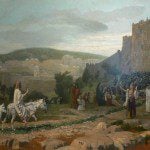
(Wikimedia Commons public domain photograph)
I’ve been posting some notes over the past few weeks from my evening readings in the New Testament book of Acts. As I’ve noted, Acts is the second-half of a two-part work by the same author, Luke, which scholars commonly call Luke-Acts. In that light, I offer here a summary passage from Mark D. Roberts, Can We Trust the Gospels?: Investigating the Reliability of Matthew, Mark, Luke, and John (Wheaton, IL: Crossway Books, 2007). Roberts, who, at the time his book was published, was senior pastor at Irvine Presbyterian Church in southern California, earned a Ph.D. in New Testament studies from Harvard University.
Here, Roberts is commenting on Luke 1:1-4. I give the King James Version of that passage for reference, although he supplies his own translation:
1 Forasmuch as many have taken in hand to set forth in order a declaration of those things which are most surely believed among us,
2 Even as they delivered them unto us, which from the beginning were eyewitnesses, and ministers of the word;
3 It seemed good to me also, having had perfect understanding of all things from the very first, to write unto thee in order, most excellent Theophilus,
4 That thou mightest know the certainty of those things, wherein thou hast been instructed.
- “Many” have already “set down an orderly account” of the events concerning Jesus. The phrase “set down an orderly account” refers to writing a narrative. Luke consciously drew upon more than one or two written sources.
- The events concerning Jesus “were handed on to us by those who from the beginning were eyewitnesses and servants of the word.” “Handed on” is the language of oral tradition. It conveys the intentional passing on of stories and sayings. “Eyewitnesses” are those who actually saw and heard Jesus in the flesh. “Servants of the word” are those who preached and taught. So Luke attests to a thriving oral tradition about Jesus which was passed on by preachers and teachers. Yet these were not just any old servants of the word. Luke paid particular attention to those who based their preaching and teaching on their own eyewitness experience of Jesus.
- Luke decided to write his Gospel “after investigating everything carefully.” In other words, he read the “many” written accounts of Jesus studiously, and made an effort to sift through the relevant oral traditions. Luke claims to be a thorough historian who has done his scholarly homework.
- What is the point of Luke’s effort? He writes so that Theophilus “may know the truth” concerning Jesus. The ESV translates a bit more literally, “so that you may have certainty concerning the things you have been taught” (Luke 1:4). Luke has written his Gospel, paying close attention to the sources at his disposal, so that the reader might have confidence concerning who Jesus was, what he did, and why he matters. The “why he matters” part is expanded in Luke’s second volume, which we call the Acts of the Apostles. (64-65)












